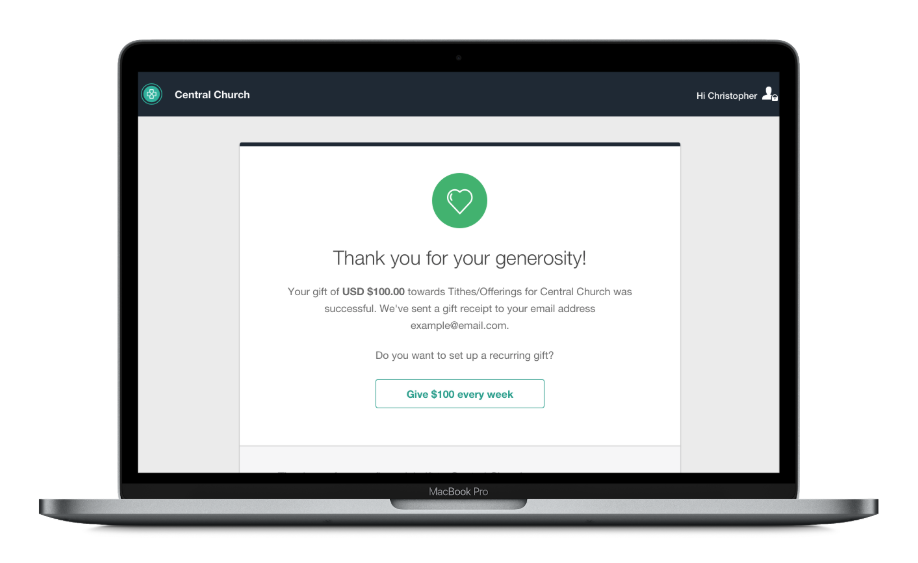Recurring Giving: How to Increase Recurring Donations
Updated May 22, 2024 |
Recurring giving is a powerful tool that helps churches weather fluctuations in donations throughout the year. Regular, scheduled donations contribute to a strong financial foundation, enabling churches to plan, grow, and serve their communities more effectively. But, although most people want to display generosity to their church, not everyone will go out of their way to give — unless it’s made very easy. Many churches miss out on generosity simply because they use a giving tool that isn’t up to the task. And bad tech shouldn’t be a barrier to generosity.
What is recurring giving?
Recurring giving is a feature of church giving platforms that lets your church members set up monthly, automatic donations. After picking a day they want their gift to occur each month, they don’t have to touch anything again. It’s the easiest way to give. And it’s ideal for your church staff too. But, even churches that are fully on board with recurring giving often don’t know the best ways to encourage it.
This guide will walk through everything churches need to know about recurring giving, including some of the biggest benefits and tips for increasing it.
How regular giving strategies fall short
When church members consistently give to your church every month, you might be tempted to think you don’t need to encourage recurring giving. But, that’s not true. Even when someone gives regularly, there can be inconsistencies. They may give according to what they have left over each month instead of prioritizing giving. Or the amount may fluctuate due to the ups and downs of their financial situation. Or they may give on an unpredictable schedule, based on which services they happen to attend.
On the other hand, recurring giving is consistent.
Other benefits of recurring giving
Aside from consistent donations, there are a few other benefits to recurring giving that are worth noting.
- It inspires thoughtful, planned giving. In practice, recurring giving is similar to the way most people pay their bills. If they use a budget, giving becomes part of their regular expenses. If they don’t, they still have to anticipate how much money is coming out of their account each month and plan their purchases accordingly. Recurring giving is a one-time decision that impacts people every month and affects their lives the same way as writing a check would—but without the hassle and without the barriers that non-recurring giving can create.
- It removes the temptation not to give. Constantly struggling with other important and justifiable ways to spend money is a legitimate temptation that undermines the consistent giving of many. Every month givers have to decide to give again. As their circumstances change, new desires and financial hurdles may compete with their desire to be good stewards. Some people can handle the temptation not to give. Others (especially newer givers) will have varying degrees of success. By making it easy for users to set up recurring giving, churches are doing their part in removing the temptation associated with renewing the decision to be a giver every week
- It paves the way for spontaneous giving. Without recurring giving, all giving feels like a spontaneous decision. Through recurring giving, people learn they can live comfortably and happily on less than they imagine. It’s not long before they realize giving isn’t a huge sacrifice—it’s a joy. This opens them up to spontaneous generosity on top of their regular giving.
- There’s nothing for people to forget. It’s also worth noting: some people have the desire to give and they can overcome the temptation not to give, but they just can’t remember to do it. That shouldn’t be surprising. Most people write fewer checks and carry less cash than they used to. In fact, some people don’t ever write checks. So if passing the plate is the main way people give at your church, you’re asking them to remember something they never carry or to make a pit stop at the ATM, which they don’t normally do.
Even with online giving, people can forget to give. Because they can give any time, anywhere, some church members may be in a constant state of waiting for the best opportunity to give. They’ll do it when they get home. When their paycheck clears. After they finish a project. Or after they relax for a bit. Distractions constantly come up, so if giving feels like something that can be done at any time, some church members will perpetually tell themselves they’ll do it later. Recurring giving lets people act once on their desire to give, when they have an opportunity to think it through, and they don’t have to keep remembering to act on that desire every month.
Ultimately, recurring giving eliminates barriers to regular giving and allows more of your congregation to live generously and faithfully steward what God has given them. The decision to give regularly can be a spiritual battle. Recurring giving just means that once someone wins that battle, your church isn’t asking them to fight it again every month.
How to increase recurring giving at your church
If you want people to start recurring giving, you need a plan to encourage it. Here are some ways to get more of your congregation to set up an automatic withdrawal.
Make recurring giving the norm
Churches that make recurring giving the default usually see an average 6% increase in recurring donations because it effortlessly makes giving a habit. People can enter their information once, decide when to give and how much to give, and then it’s good to go. This still feels foreign to many churches, but the reality is your congregation is already used to making recurring transactions. They already have subscriptions, bills, and donations to nonprofits that withdraw money from their bank account automatically.
This isn’t new to them. That’s why we allow churches to make recurring giving the default option for digital giving within the Pushpay app. This dramatically increases recurring giving because it encourages donors to take the next step at the moment they’re most open to it.
Talk about recurring giving often
It’s never comfortable to talk about giving in church. But it’s an important part of your church members’ spiritual journeys. If you want people to give in a certain way, an annual giving sermon isn’t the only time you should be talking about it. Every week most churches announce when it’s time to pass the offering plate. This normalizes physical giving, and it’s a missed opportunity to normalize recurring giving too.
It takes seconds to demonstrate how recurring giving works. If you want people to do it, you need to tell them about it and show them how to do it as often as you can.
Focus on regular givers
The best candidates for recurring giving are the people who already give all the time. For your regular givers, transitioning to recurring giving isn’t a major leap of faith or even necessarily a bigger financial commitment (though recurring givers do give more on average). It’s mostly just a matter of convenience.
Our donor development features let you identify everyone in your church who gives regularly but doesn’t have recurring giving set up. You can change your communications to fit the giving stage each person is in, making it easy to guide them to the next best step—in this case, that means taking them from regular giving to recurring giving.
Encourage occasional givers to take the leap
A lot of church members give sporadically throughout the year. Sometimes it’s because they give what they have left at the end of the month (and there’s not always something left). Or maybe they only give when they hear about a specific cause or fund they want to contribute toward. Whatever their reasons, some of these people would switch to recurring giving with a little nudge. You can send them unique communications—just as you can with regular givers—but they may need to hear more about the spiritual importance of giving and the growth that comes through trusting God with our finances. Or maybe they need to hear more about your ongoing ministries so they can be inspired to make a difference on a more regular basis.
By talking to church members where they are, you can significantly increase the number of people who start recurring giving.
Use “Recurring Suggestion”
One of the best times to encourage recurring giving is in the moment someone gives. That’s why we developed the Recurring Suggestion feature for Pushpay. You simply turn it on, and every time someone gives to your church, they’ll get a simple, natural nudge to consider making their gift a recurring donation.

Recurring giving is a one-time decision. Once someone turns it on, they don’t have to make a conscious decision to give each month. As a form of online giving, it also replaces the weekly ritual of passing the offering plate, which many Christians see as synonymous with tithing.
But with all that the Bible has to say about tithing, it’s clear that beyond whether we give, God is most concerned about the state of our hearts when we give (2 Corinthians 9:6-7), not the methods we use to do it. Still, some people are wary of recurring giving because tithing is a spiritual discipline, and recurring giving turns the ritual of giving from a regular practice into a one-time decision.
The reality is that recurring giving is a decision people will be thinking about long after they’ve made it—perhaps every time they spend money. And making a spiritual discipline easier to practice allows more people to participate.
Get The Ultimate Guide to Growing Recurring Giving
Recurring giving increases overall giving, lessens the impact of seasonal dips in giving, and makes it easier for your church members to participate in the spiritual practice of generosity. But if you want to increase the number of people who give in this way, you need an intentional strategy.
That’s why we want you to have a free copy of The Ultimate Guide to Growing Recurring Giving.
Featured Content
You May Also Like
